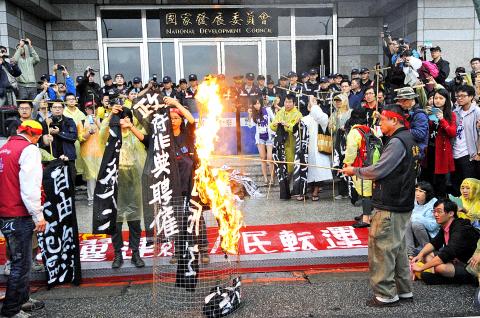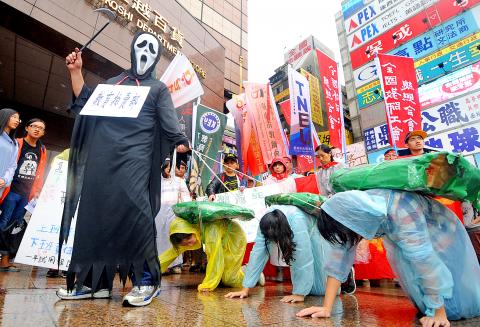After convening at three rallies held in different locations across Taipei, nearly 1,000 protesters carrying flags and banners swarmed the MRT yesterday to participate in the Autumn Struggle (秋鬥), an annual protest march organized by labor groups, congregating in Ximending (西門町) before marching on to protest in front of the National Development Council.
The train ride was included as part of the protest as a critique against the “capitalist values” the MRT represents, protest organizers said, adding that although most might see the trains as a symbol of urban development, they also function as a “transportation belt” to “send overworked employees into the hands of their employers every day.”
As the three processions moved through the streets in rainy weather, protesters shouted slogans including “We want economic democracy with the workers in charge” and “Citizens take a left turn, return the nation to the people” over the rhythmic beat of makeshift drums made from empty water barrels.

Photo: Chen Chih-chu, Taipei Times
The annual event, first held in 1993 by the Committee for Action on Labor Legislation and later by its successor movement Raging Citizens Act Now, focuses on different labor rights-related themes each year, and acts as a rallying call for many activist groups to express their outrage toward government policies that they say are skewed toward capitalists and large corporations.
This year, organizers accused the newly formed National Development Council of “single-minded pursuit of economic development” and its proposal to establish free economic pilot zones — special territories with reduced tariffs and other trade incentives — which the organizers say would exacerbate economic inequality and increase unjust cases of land seizures.
The initial three rallies, which started at noon, invited participation from more than 60 activist groups to participate according to three themes: land rights or movements against forced expropriation projects; labor rights advocates; and student groups campaigning against the privatization of higher education.

Photo: Liao Chen-huei, Taipei Times
Scuffles with police occurred when land rights activists attempted to enter the Democratic Progressive Party’s (DPP) headquarters to protest what they say is the party’s inaction in protecting people against land expropriation projects, with the protesters leaving banners that labeled the party “The Regressive Party” before leaving.
The protesters also gathered in front of Chinese Nationalist Party (KMT) Taipei mayoral candidate Sean Lien’s (連勝文) campaign headquarters, bestowing on him a large inscribed placard that read: “[For your] contribution to luxury mansions,” a sarcastic reference to Lien’s residence in The Palace (帝寶) — the most expensive piece of real-estate in Taiwan — as well as his alleged connections with wealthy corporations.
The three processions gathered at the Ximending MRT station at about 3pm, crowding the platforms before streaming out to attend a joint demonstration outside.
The day’s events ended with the activists marching to protest in front of the National Development Council while carrying a large fake turd over their heads — an allusion to President Ma Ying-jeou’s (馬英九) vow to create a “golden decade (黃金十年)” of economic development, which in Mandarin, is pronounced similarly to “golden year of the turd (黃金屎年).”

Chinese spouse and influencer Guan Guan’s (關關) residency permit has been revoked for repeatedly posting pro-China videos that threaten national security, the National Immigration Agency confirmed today. Guan Guan has said many controversial statements in her videos posted to Douyin (抖音), including “the red flag will soon be painted all over Taiwan” and “Taiwan is an inseparable part of China,” and expressing hope for expedited reunification. The agency last year received multiple reports alleging that Guan Guan had advocated for armed reunification. After verifying the reports, the agency last month issued a notice requiring her to appear and explain her actions. Guan

GIVE AND TAKE: Blood demand continues to rise each year, while fewer young donors are available due to the nation’s falling birthrate, a doctor said Blood donors can redeem points earned from donations to obtain limited edition Formosan black bear travel mugs, the Kaohsiung Blood Center said yesterday, as it announced a goal of stocking 20,000 units of blood prior to the Lunar New Year. The last month of the lunar year is National Blood Donation Month, when local centers seek to stockpile blood for use during the Lunar New Year holiday. The blood demand in southern Taiwan — including Tainan and Kaohsiung, as well as Chiayi, Pingtung, Penghu and Taitung counties — is about 2,000 units per day, the center said. The donation campaign aims to boost

The Kaohsiung Tourism Bureau audited six hotels in an effort to prevent price gouging ahead of Korean band BTS’ concert tour in the city scheduled for Nov. 19, 21 and 22 this year. The bureau on Friday said that the audits — conducted in response to allegations of unfair pricing posted on social media — found no wrongdoing. These establishments included the local branches of Chateau de Chine, Hotel Nikko, My Humble House, and Grand Hai Lai, it said, adding that the Consumer Protection Commission would have penalized price gougers had the accusations been substantiated. The bureau said the Tourism Development Act

The Central Weather Administration (CWA) said a magnitude 4.9 earthquake that struck off the coast of eastern Taiwan yesterday was an independent event and part of a stress-adjustment process. The earthquake occurred at 4:47pm, with its epicenter at sea about 45.4km south of Yilan County Hall at a depth of 5.9km, the CWA said. The quake's intensity, which gauges the actual effects of a temblor, was highest in several townships in Yilan and neighboring Hualien County, where it measured 4 on Taiwan's seven-tier intensity scale, the CWA said. Lin Po-yu (林柏佑), a division chief at the CWA's Seismological Center, told a news conference